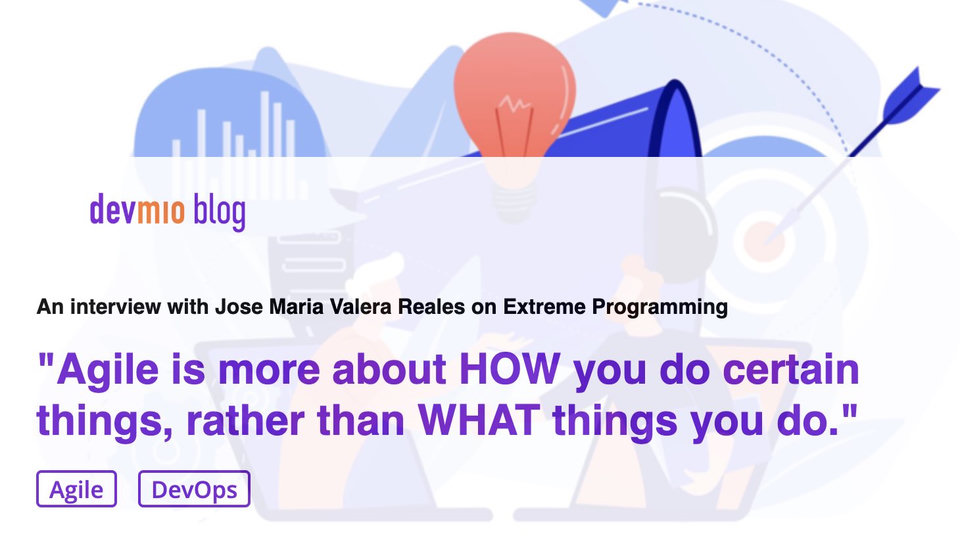
Interview About XP and Agile

My interview with devm.io regarding Agile and Extreme Programming.
devm.io: We talked to Chema, a software developer and an Extreme Programming expert, about his favourite topic and his upcoming live event Update Your Team To Be More Extreme.
Could you tell us a little about yourself, who you are, and what you do?
Chema: My name is Jose Maria Valera Reales, but everyone calls me Chema. I’m originally from Spain but have lived in Berlin since 2015. I’ve been working as a software developer since 2013. In recent years, I have focused on achieving excellence and figuring out how to help my peers and, with them, the entire software community to improve in our profession.
I am currently a Tech Lead at Lautsprecher Teufel GmbH, where I work with the e-commerce webshop team. I also enjoy open-source software, so I enjoy creating pull requests for other repositories, and I also love when I receive pull requests from others.
How would you describe Extreme Programming? What makes it so “extreme?”
Extreme Programming is the most straightforward and pragmatic approach to embracing Agile in your software team. It incorporates solutions based on values, principles, and practices. You don’t have to use or do everything, but rather whatever fits you and your team in your context. However, these are helpful general solutions that work better when combined.
From my experience, the word “extreme” can be misleading, but I see it as an opportunity to emphasise the difficulty of the fundamentals behind it. The critical point is realising that our “common sense” is not as “common” as we tend to think, nor the best practices for practical teamwork. Therefore, this is about pushing ourselves to extreme effectiveness, collaboration, and satisfaction while working with others.
You will host a live event on devm.io on the topic on January 19th. Could you give us a sneak peek of what your audience can expect?
We will explore how a software team works nowadays, the common issues we encounter, and what solutions we could apply to improve our team routines. We will look for the real meaning of Agile, focusing on Extreme Programming ideas.
In addition, I will share some ideas to help your team create learning opportunities with concrete examples that any team can incorporate into their current work.
During the event, you will also tell us something about Katas. What exactly are Katas?
The term “kata” comes from the repetitive movements done in karate that help you improve your fighting skills.
Why “code katas?” Because as a group, we need to practice more. Most of our learning takes place on the job, so most of our mistakes are also made there. And because we want to keep PROD, we’re reluctant to try new things.
Katas exist to help developers get the same benefits you would get from practice in any other profession. These simple, simulation exercises let you experiment and learn without the pressure of PROD. There are no right or wrong answers in any software kata: the benefit comes from the process, not the result.
There are katas to help you improve your refactoring skills (such as Gilded Rose Refactoring Kata by Emily Bache) or your testing skills (easy ones like Fizz Buzz or Roman Numerals, or more advanced ones like the Bank Kata by Sandro Mancuso). They’re also great for building confidence when programming with others, watching and practising different roles collaboratively, fostering team cohesion, etc.
What role do Agile methods play in software development for you?
The very first question here is to define what Agile methods are. In the end, everyone communicates somehow, provides feedback to others, and simplifies to some level. Sometimes people have the courage to speak their minds and sometimes they do not, and usually, they try to respect their peers. So, for me, Agile is more about “how” you do certain things rather than “what” things you do.
Agile is a highly collaborative working process at any level, which might have a challenging learning curve at the beginning, but it pays off sooner than you might expect.
Which topic in the area of agile should receive more attention?
Team building and embracing agility, starting with asking “why?” We need to challenge the status quo more often and ask ourselves why we work the way we do and how and what we could do differently to keep improving and never stop learning.
You can also read the interview from the original link: https://devm.io/agile/extreme-programming-agile.